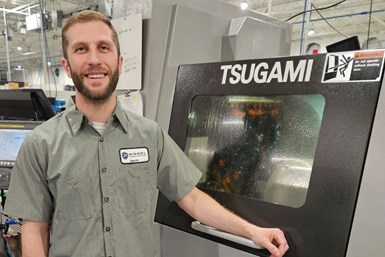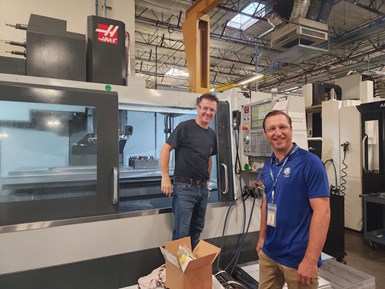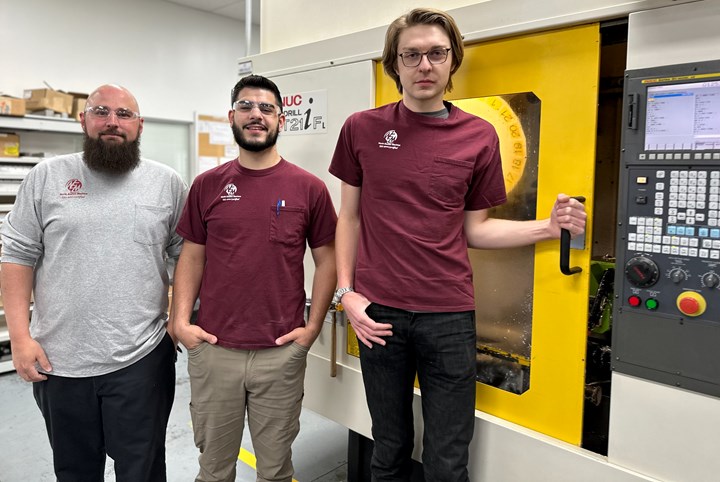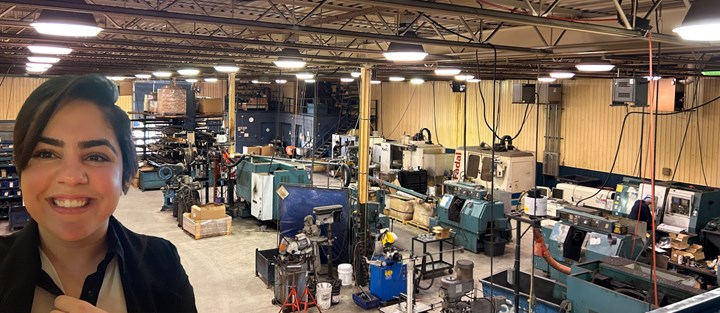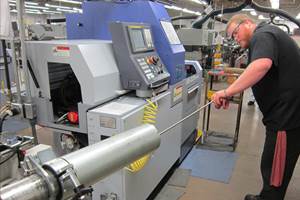In an industry that continuously evolves, it goes without saying that its leadership must adapt to the changes. The leaders who stand out are the ones who seamlessly and positively steer their teams toward success despite the challenges they face.
Production Machining has once again discovered a group of young leaders who do just that. These talented pacesetters go above and beyond what is asked of them in their positions on the machine shop floor by creating solutions for issues that arise and discovering ways to improve processes. They are also helping to strengthen their co-workers’ skills as well as the labor force outside of their own companies.
Here, these five winners explain some of the projects they have led which positively influenced shopfloor efficiency and/or customer service and which showcase their problem-solving skills. As workforce development champions, they have smart viewpoints regarding boosting their co-workers’ skill sets and ideas about how to inspire the next generation to explore manufacturing as a career possibility.
Swiss Rejuvenation Doubles Shop Productivity
When Emerging Leader Darrin Baker came on board at Liberty Precision Machining (New Berlin, Wisconsin) three years ago as a CNC Swiss machinist, there were seven Tsugami Swiss lathes and four legacy Swiss
In the last 13 years, Emerging Leader Darrin Baker has specialized in Swiss machining, creating parts for virtually every industry. At Liberty Precision, he is helping build a formidable Swiss department, an inspiring part portfolio and some respectable careers, he says. “The leadership path that I have been on is rewarding; we are not just making parts but helping people build a life.” Photo Credit: Liberty Precision Machining
machines on the shop floor with a couple machinists operating them. But as he progressed to CNC Swiss lead and later to his current position as CNC Swiss production supervisor, Baker helped the department double its productivity, according to his nominator and CEO of the company, Bill Berrien.
Replacing legacy equipment (which ate up a lot of the machinists’ bandwidth with the need for constant repairs and lengthy setups), purchasing five new Tsugami CNC Swiss lathes and expanding the Swiss department to include the company’s Doosan TT lathes brought the department to a total of 15 machines with a much lower average machine age.
These changes, combined with hiring more machinists with experience, and with successful leadership from Baker and the 11 years of Swiss experience he brought to the department, it is now more efficient than ever before, providing more advanced manufacturing capabilities to its customers.
Offering a new energy to the department, Baker integrated some new ideas including staging jobs. He says doing this enables the department to stay ahead of schedule and save money by eliminating the need to place last-minute, overnight orders of cutting tools and other job components. The company also started pushing a heavy lights-out campaign, running 7 days a week with some jobs hitting 24-hours-a-day operation.
To fill needed positions on the CNC Swiss shop floor, Liberty upskilled some existing employees to operate the machines. The company, a sister company of Pindel Global Precision also located in New Berlin, implements the Pindel Professional Development Program of upskilling employees by offering on-the-job training to advance their careers within the company (read “There’s No Downside to Upskilling” in the PM July issue).
Baker has been a part of upskilling much of the Swiss department at Liberty. He says 90% of the department’s machinists have taken some form of upskilling courses, and if it takes into account ToolingU courses, that number is 100%. “Four of us have received Esprit CAM software training, some of us multiple iterations of that from basic to advanced Swiss training. I personally am taking leadership training through Living as a Leader, a Wisconsin company.” Photo Credit: Liberty Precision Machining
Upskilling has played a large role in Liberty’s success. In fact, the rejuvenation of the CNC Swiss department could not have been possible without upskilling much of the department’s staff.
Baker tells the success story of a woman who went through the company’s upskilling program via the Swiss department. As a janitor who worked for a janitorial company that Liberty hired to clean the facility, this woman is now a CNC Swiss machinist on the shop floor. “She showed a knack that we noticed,” Baker explains. “She was constantly staying busy, was detail oriented and seemed like a solid person.”
Liberty gave her some brief training, sent her to the local technical college for a Swiss boot camp program lasting a few months, and now she is back and working on the shop floor, only this time, she is not cleaning it.
The added Swiss capabilities that are available due to upskilling has helped earned the company’s AS9100 certification, creating the opportunity for aerospace manufacturing.
Baker says, “Without the expertise, hard work and trust of my team, none of this would be possible.”
And, because he strives to help his co-workers grow, he is continually working to improve his leadership skills by attending leadership training courses.
According to Berrien, “Darrin truly embodies the mantra: ‘Accomplish the mission and take care of your people.’ And we couldn't be happier to have him as a leader at Liberty Precision.”
Tactical Expertise Shines During Transition
Launching a new facility requires a lot of preparation and strong leadership to perform the task successfully. Mike Gresen knows this well. Over the past year, he led his team through the process of opening a new Benchmark Electronics location without interrupting supply to customers and within the company budget, shutting down production for only three business days.
As director of programs, Gresen is the point of contact for Benchmark’s customers. Therefore, when the company outgrew its Tempe, Arizona, building and moved its warehousing and vertical integration departments (half of the business) to this new facility in Mesa, Arizona, he acted as the liaison between the site transition team and the customer to ensure the team was meeting customer expectations. The team’s responsibilities included managing deliveries, meeting customer specifications, qualification timelines and more.
A huge undertaking such as this must rely on capable and efficient teams, teams which Gresen led but refused to micromanage. He defines his leadership style as one with team-building attributes that enables people to
Emerging Leader Mike Gresen (right) is pictured with Jacek Bednarz, machinist, at Benchmark Electronics. Gresen is one of the senior leaders at Benchmark's Mesa, Arizona, location, winner of the company’s President’s Award. The award is given to the site that exemplifies the core values and vision of the company while improving delivery, customer satisfaction, employee inclusion, revenue and returning value to shareholders. “Our site was challenged with meeting our internal and external commitments,” Gresen explains. “My responsibility was leading the customer focus teams and keeping the site on a path that followed both the internal vision and external voice of the customer.” Photo Credit: Benchmark Electronics
make their own decisions. “I want to work with my team, helping them break down barriers so they can be successful,” he says. “Because the stronger that my team is around me, the better we’re all going to be, and the better and more successful I’ll be.”
Gresen in fact delegated the transition responsibility to another member of his team, but being the prudent leader he is, he played a supporting role. He attended the transition meetings with the customer and had internal discussions with the team to ensure that his co-workers had the necessary tools to keep the project on track and that they were focused on the right priorities.
“If there were any issues among the team, the person running the project and myself, we would interface with the customer to figure out what they needed, what we were missing and what challenges they were having,” he explains. Integrating this process facilitates a smoother transition which, in turn, creates a happier customer.
He adds that he and his team did a lot of upfront preparation for the move. Besides guaranteeing that the new site was ready to intake the new work, certifications and qualifications had to be in place prior to opening a new location.
Benchmark offers concept design and prototype creation to full-volume production of parts for industries such as aerospace, defense, medical and semiconductor. Since Gresen first began working there 12 years ago when he was an intern earning his engineering degree, he has had many opportunities at the company. He has guided a team of 25-plus people as production supervisor, lead a cross-functional team as a program manager and has traveled the world as a global account manager. He has also served in the engineering and operations departments.
“My past and current experiences continue to help steer me to my goal of leading a site or company in the manufacturing industry,” he says. He appears to be well on his way to accomplish this. His nominator and general manager at Benchmark, Jeremy Austin, says, “Mike provides leadership, along with a great attitude, pulling together departments, which contributes to our One Benchmark environment,” he explains. “His future is bright, and I can easily see him being a general manager and corporate leader.”
Dedication to Education
Instilling confidence throughout a shop floor can do wonders for company morale while increasing productivity. This is what Emerging Leader Josh Kirchoff, shop manager at Progress Manufacturing Inc. in West Bend, Wisconsin, has discovered from focusing on workforce well-being and sharing his passion for the industry with his co-workers.
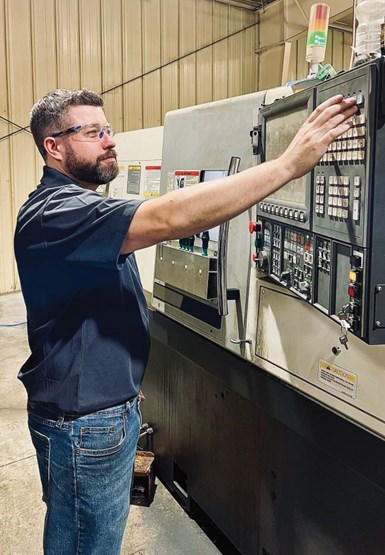
Emerging Leader Josh Kirchoff began his machining career at Progress Manufacturing 20 years ago at age 16 when he was a machine operator. “My passion and love of machining eventually landed me at a technical college, where I received a degree in CNC/Tool and Die Technologies,” Kirchoff says. “While in school, I continued to work at Progress where I quickly moved up and became head of the milling department. A few years ago, I took on managing the entire shop floor, where I focused on the culture and workforce development at our company.” Photo Credit: Progress Manufacturing
In just over a year, this contract shop of low- and high-volume CNC machined parts in the recreational, agricultural, construction and lawn and garden industries went from experiencing multiple employee absences daily to employees who were excited to come to work, due in part to Kirchoff’s influence. This Emerging Leader’s nominator says he gives workers a reason to show up each day by inseminating enthusiasm and pride in them, and simply caring about each person.
“Every single employee I have gathered feedback from states that Josh was the best teacher and mentor they have ever had,” says Natalie Haver, HR manager at Progress Manufacturing and Kirchoff’s nominator. “Josh takes the time to train and mentor people as well as get to know them on a personal level. I know the connection our co-workers have with Josh is what makes their job that much more enjoyable.”
“I was always excited about manufacturing, but to transfer that feeling to someone else is exhilarating,” Kirchoff explains. He also enjoys being challenged on the shop floor. “It’s fun to try to find clever ways to solve problems that come up.”
Longing for his co-workers to share his sentiments, he has helped educate and upskill many Progress Manufacturing employees which, as a result, has helped build their confidence as well as their skill sets. He believes that first educating/training team leaders assists with team building and the learning process. Team leaders are expected to pass their new knowledge down to their team members. “So, the team leaders help educate a group of five or six people,” he says. “This gives team members more one-one and hands-on time to learn.”
This process enables all employees to become more self-sufficient. Sometimes employees start with the skills of an operator, then progress to those of a setup person and eventually they might learn how to operate many different machines instead of only one, Kirchoff explains.
Besides using Kirchoff’s own knowledge from his background in CNC machining, Progress Manufacturing uses online learning to teach technical skills with classes on subjects such as blueprint reading, basic programming for lathes or VMCs and much more. The website enables employees to expand their knowledge at their own pace or deadlines can be assigned for the completion of classes.
Goal setting for employees has also been a successful way to track Kirchoff’s co-workers’ progress at the machine shop and keeps the team motivated.
Introducing CNC Swiss to Local Students
Dedicated to the future of manufacturing, Emerging Leader Mike Medeiros understands the importance of community outreach that educates people about the industry. In fact, this production manager at North Easton Machine Co. (North Easton, Massachusetts) represents the industry by sitting on his local high school’s advisory board. For five years, he has been advocating CNC Swiss lathes, attempting to persuade the administration to add the technology to the school’s machining program.
“Twice a year we meet as a board and at every meeting I talked about the importance of bringing in Swiss-type CNC lathes to the program,” Medeiros states. “There are so many manufacturers that are local to this school that run these machines. It’s going to benefit us and it’s going to benefit the
Mike Medeiros (production manager), Alan Chaves (CNC lathe programmer), Cayden Ward (CNC mill programmer) standing next to a machining center at North Easton Machine. Emerging Leader Medeiros describes himself as a continuous learner who has always found manufacturing to be a gratifying industry. “Being a hands-on leader enables me to feel all those successes while simultaneously helping others grow. There’s no greater satisfaction than that,” he says. Photo Credit: North Easton Machine
students. There are going to be a lot more companies that want to pull in a co-op student with a Swiss background.” He eventually convinced the board by explaining that he personally has held many positions locally that were all Swiss jobs.
To get the process moving, Medeiros acted as a coordinator/liaison. First, he facilitated the school contacting machinery dealers and spoke with the salespeople. They discussed which machine would be the best option for the school. Then, he organized a meet-and-greet with the high school and another manufacturer with a Citizen A20 Swiss lathe on its shop floor.
The meeting resulted in the school agreeing that the technology would be a good addition to the program. By the time this article is published, the high school will have that machine on its shop floor, thanks to Medeiros’ persistence and the coordinated efforts of fellow board members who also share a passion for CNC Swiss.
Now, North Easton Machine’s Swiss department — as well as other local manufacturers — will benefit from the skilled students graduating from this high school program. The shop — which offers Swiss, CNC lathe and CNC
Medeiros shares his industry knowledge in his new role as an instructor for an Advanced Manufacturing and Photonics Certificate program at Stonehill College in North Easton.
milling machining for the biomedical, defense, aerospace and electronics industries, among others — works with four area high schools to recruit for co-ops and internship positions as early as a student’s junior year.
“Instead of learning at their schools’ shops, they come to us for a co-op that is usually one week on, one week off, or two weeks on, two weeks off,” Medeiros describes. “We provide them with the opportunity to work on live, customer-based jobs in our various departments. Then, if we decide that the placement was mutually successful, we offer them a full-time role upon graduation.”
Through Medeiros’ partnership with the high schools, North Easton Machine has expanded its co-op program with a student on staff each school year since 2017.
Besides building a strong workforce through promoting manufacturing at regional high schools, Medeiros shares his industry knowledge in his new role as an instructor for an Advanced Manufacturing and Photonics Certificate program at Stonehill College in North Easton.
“I’d like to thank the team for all their hard work, commitment to quality and for placing their trust in me this past decade,” he says. “Every year, we accomplish greater heights and they continue to help me grow as a leader.”
His nominator, Paula Martel, says he inspires his staff daily to work as a team to achieve production goals. “I am nominating Mike because he represents the future of leadership in the industry,” says Martel, administrative manager at the company. “He is able to draw out the best in people with a genuine, patient, goal-oriented style.”
Problem-Solving Skills Cool Down a Hot Project
Emerging Leader Masooma Morad has worked her way up from being a co-op student at Advanced Control Systems (ACS) in Uxbridge, Ontario, Canada, in 2010, to her current position as vice president of the company as well as developer of the Yamaha/ACS ice scratcher.
Her development and creation of the product, which was her first project at the company, began with a call for help from Yamaha to ACS, a manufacturer of snowmobile products. Yamaha explained that its snowmobile’s engine and tracks would overheat when the vehicles rode on packed ice, Morad says.
Following several experiments she conducted in the lab, Morad developed a product made from 304 stainless steel rope jacketed in a polyethylene tube with a strong replaceable carbide tip at the end. As a set of two, one end of each tube attaches to each side of a snowmobile on the rear suspension rails. The other end contains the carbide tip designed to drag on top of the
Emerging Leader Masooma Morad takes pride in Advanced Control Systems’ community involvement. She has started numerous initiatives with local entities such as sponsoring young snowmobile racers on the Canadian Snowmobile Association and sponsoring kids to ensure they participate in summer camps. She is also committed to integrating sustainability into the company’s products. Photo Credit: Advanced Control Systems
compacted snow, spraying snow into the engine to cool it down. The ice scratcher does the same in both forward and reverse motions of the snowmobile, without breaking the carbide tip or snapping the ice scratcher. If the tip becomes dull overtime, it can be easily replaced without purchasing an entire ice scratcher.
The product was a huge hit in the industry when Morad developed it in 2010. In fact, it is now a common product that most snowmobile OEMs have implemented. “By the time I thought to patent the product, other manufacturers had already caught on and duplicated it.”
She says the most challenging aspect of the project was creating a tip that was not so brittle that it would break on hard ice and, at the same time, one that did not have a strap that was too loose so that it would bounce up and hit the engine.
Morad beams as she recalls the project. “It was one of the best experiences and one in a million that I would ever have,” she says.
“I have hired newcomers who could barely speak their languages, and I was able to speak with them to teach them how to operate a machine,” Morad says.
According to her nominator, these projects are what motivate Morad. “Feeling a fervid sense of purpose, whether in her product creation or simply searching for solutions, she is always looking for customer’s unforeseen needs. This gives her a joyful feeling of accomplishment and perception of being on the right path in life,” says Roudaina Chahrour, digital marketing coordinator at the company.
But customers are not her only concern; she cares a great deal about her new employees as well as her local community. She is a mentor to many who come to work at ACS, which she describes as a discrimination-free environment. Because Morad knows seven languages, communication is not often an issue when working with people of different nationalities. “For example, I have hired newcomers who could barely speak their languages, and I was able to speak with them to teach them how to operate a machine,” she explains.
Morad would like to thank her parents for giving her opportunities she would not have had if they had not immigrated to Canada. “My parents left everything in Afghanistan and came to India as an Afghan refugees, then immigrated to Canada because they wanted better futures and better education for their kids,” she explains. “My dad has his Ph.D. in mathematics, and my mom was a teacher.”
Related Content
6 Tips for Training on a Swiss-Type Lathe
There are nuances to training a person to effectively operate a Swiss-type lathe. A shop I visited a while back offers some suggestions.
Read MoreJob Candidate Questions and What They Tell Us
Individuals who ask thoughtful, original questions in the interview set themselves apart.
Read MoreStrengthening Manufacturing Workplaces Through Active Listening
A good strategy to weather the storms of manufacturing market upheavals and unpredictable factors is to commit to continuous, active employee listening.
Read MoreManufacturing Skills Training: Virginia Martinez and Laiken Carrillo
Roles of Women in Manufacturing Series: A precision machining career starts with skills. Virginia and Laiken share their journey and how they help prepare the next generation.
Read MoreRead Next
Seeing Automated Workpiece Measurement in Real Time
User-friendly inspection software for CNC machining centers was shown at IMTS 2024 monitoring measurements between and after machining while performing SPC based on recorded measurement values.
Read MoreA Tooling Workshop Worth a Visit
Marubeni Citizen-Cincom’s tooling and accessory workshop offers a chance to learn more about ancillary devices that can boost machining efficiency and capability.
Read More5 Aspects of PMTS I Appreciate
The three-day edition of the 2025 Precision Machining Technology Show kicks off at the start of April. I’ll be there, and here are some reasons why.
Read More









